- Clone
- 14G10A21 (See other available formats)
- Regulatory Status
- RUO
- Other Names
- Nuclear factor NF-kappa-B p65 subunit (NF-κB p65), Rel-A, transcription factor p65, Nuclear factor of kappa light polypeptide gene enhancer in B-cells 3 (NFKB3)
- Isotype
- Mouse IgG2b, κ
- Ave. Rating
- Submit a Review
- Product Citations
- publications
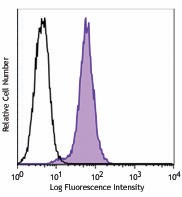
-

Human lung adenocarcinoma epithelial cell line A549 was fixed and permeabilized with FOXP3 Fix/Perm Buffer Set, and then stained with NF-κB p65 (clone 14G10A21) PE (filled histogram) or mouse IgG2b, κ PE isotype control (open histogram).
| Cat # | Size | Price | Quantity Check Availability | Save | ||
|---|---|---|---|---|---|---|
| 653003 | 25 tests | 123€ | ||||
| 653004 | 100 tests | 288€ | ||||
NF-κB p65 is a member of REL-like domain containing protein family, which forms a NF-κB complex with the other family members: NF-κB1 (p105/p50) or NF-κB2 (p100/p52). The NF-κB complex is inactivated and held in the cytoplasm by the NF-κB inhibitor IκB. In response to activation stimuli, IκB kinases (IKKs) phosphorylates IκB, resulting in degradation of IκB and liberation of NF-κB complex. The activated NF-κB complex translocates to the nucleus and binds to κB sites in the DNA of their target genes.
Product DetailsProduct Details
- Verified Reactivity
- Human
- Antibody Type
- Monoclonal
- Host Species
- Mouse
- Immunogen
- Partial human NF-κB p65 recombinant protein (451-551 aa)
- Formulation
- Phosphate-buffered solution, pH 7.2, containing 0.09% sodium azide and BSA (origin USA)
- Preparation
- The antibody was purified by affinity chromatography and conjugated with PE under optimal conditions.
- Concentration
- Lot-specific (to obtain lot-specific concentration and expiration, please enter the lot number in our Certificate of Analysis online tool.)
- Storage & Handling
- The antibody solution should be stored undiluted between 2°C and 8°C, and protected from prolonged exposure to light. Do not freeze.
- Application
-
ICFC - Quality tested
- Recommended Usage
-
Each lot of this antibody is quality control tested by intracellular immunofluorescent staining with flow cytometric analysis. For flow cytometric staining, the suggested use of this reagent is 5 µl per million cells in 100 µl staining volume or 5 µl per 100 µl of whole blood.
- Excitation Laser
-
Blue Laser (488 nm)
Green Laser (532 nm)/Yellow-Green Laser (561 nm)
- Application Notes
-
This clone is not recommended for ChIP (Chromatin Immunoprecipitation) assays (as determined by in-house testing).
- RRID
-
AB_2562768 (BioLegend Cat. No. 653003)
AB_2562769 (BioLegend Cat. No. 653004)
Antigen Details
- Structure
- 65 kD protein containing a Rel homology domain (RHD), an activation domain, and a 9aaTAD domain.
- Distribution
-
The inactivated NF-κB complex containing p65 subunit is bound to IκB and is localized to cytoplasm. Upon activation, I-κB is phosphorylated and degraded. The activated NF-κB complex is in turn translocated to the nucleus as a transcription factor.
- Function
- NF-κB is a homodimeric or heterodimeric complex formed by the Rel-like domain-containing proteins. The most abundant form is p65 (RelA) - p50 (NF-κB1) heterodimer complex. The NF-κB complex is a ubiquitously expressed transcription factor which is involved in various biological functions, such as cell growth, tumorigenesis, differentiation, apoptosis, inflammation, and immune responses.
- Interaction
- Interacts with NF-κB1 (p105/p50) or NF-κB2 (p100/p52) to form heterodimeric NF-κB complex. Interacts with HDAC1, HDAC3, and CBP. Interaction with MEN1 inhibits transactivation activity of NF-κB complex.
- Cell Type
- B cells
- Biology Area
- Apoptosis/Tumor Suppressors/Cell Death, Cell Biology, Immunology, Neuroscience, Neuroscience Cell Markers, Signal Transduction, Transcription Factors
- Molecular Family
- Nuclear Markers
- Antigen References
-
1. Li Z, et al. 1997. Mol. Cell. Biol. 17:6184.
2. Saccani S, et al. 2004. J. Exp. Med. 200:107.
3. Nolan GP, et al. 1991. Cell 64:961.
4. Chen LF, et al. 2001. Science 293:1653.
5. Hansen SK, et al. 1994. Mol. Cell. Biol. 14:2593.
6. Chapman NR, et al. 2002. Biochem J. 366:459. - Gene ID
- 4790 View all products for this Gene ID
- UniProt
- View information about NF-kappaB p65 on UniProt.org
Related Pages & Pathways
Pages
Related FAQs
- What type of PE do you use in your conjugates?
- We use R-PE in our conjugates.
Other Formats
View All NF-κB p65 Reagents Request Custom Conjugation| Description | Clone | Applications |
|---|---|---|
| Purified anti-NF-κB p65 | 14G10A21 | WB,IP,KO/KD-WB |
| PE anti-NF-κB p65 | 14G10A21 | ICFC |
| APC anti-NF-κB p65 | 14G10A21 | ICFC |
Customers Also Purchased
Compare Data Across All Formats
This data display is provided for general comparisons between formats.
Your actual data may vary due to variations in samples, target cells, instruments and their settings, staining conditions, and other factors.
If you need assistance with selecting the best format contact our expert technical support team.
-
Purified anti-NF-κB p65
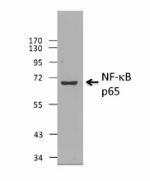
Hela cell extracts were resolved by electrophoresis, transfe... 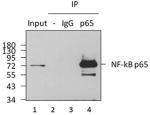
Immunoprecipitation of NF-κB p65 from Hela cell extracts. La... 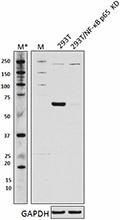
Total lysates (15µg protein) from 293T and 293T/NF-κB p65 kn... -
PE anti-NF-κB p65
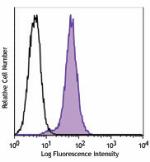
Human lung adenocarcinoma epithelial cell line A549 was fixe... -
APC anti-NF-κB p65
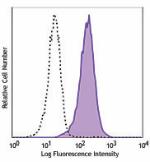
Human lung adenocarcinoma epithelial cell line A549 was fixe...
 Login / Register
Login / Register 









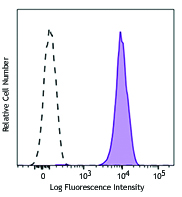
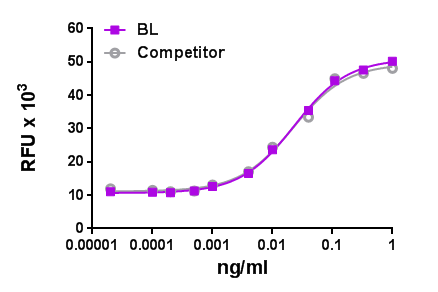
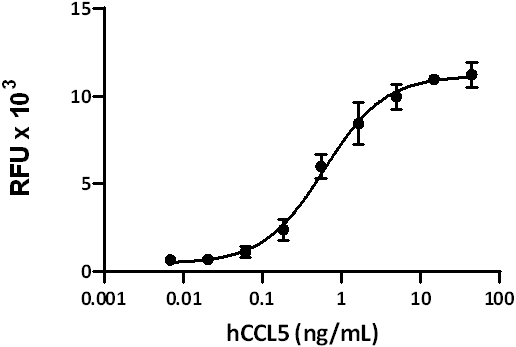
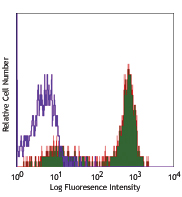



Follow Us